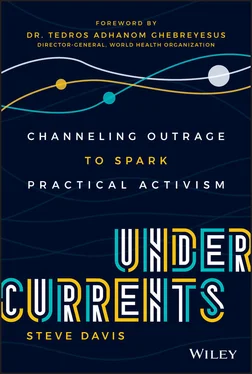But I knew even then that I was more effective as a behind‐the‐scenes strategist. Shaping policies (on anti‐discrimination and pro‐marriage laws); building alliances (with straight allies and the business community); designing programs (like Lambert House for gay and lesbian youth in Seattle); donating and raising money (for scores of LGBTQI college scholarships and LGBTQI rights organizations); or working on longer‐term systems change—these are the things that charge me up. The work of many activists across multiple platforms and generations laid the building blocks for each of those steps, paving the way for social change. We wouldn't have same‐sex marriage across the United States today without winning early legal fights to amend healthcare laws so that AIDS patients could be covered and their partners seen as family. Nor would Bob and I have been able to adopt our son without the underlying work of so many activists who fought to change family law and societal norms.
Thinking back to those years, I can hardly believe the dramatic changes generated by the undercurrents of gay activism and China's ascendance—complete transformations in just a few decades! The notion of legal same‐sex marriage was simply inconceivable to me as a young man when I first came out in Taiwan. The idea of China as a global superpower would have been impossible to reconcile with the poverty and isolation I saw in 1983 while traveling on third‐class “hard seats” through rural Shandong Province. And to have raised an adopted child from China who grew up the legal son of two dads belies anything I could have dreamed of as a young irrigator in Montana. Yet here we are. Change on a grand scale is possible, and it can happen relatively fast.
The third undercurrent of social evolution that I rode came largely from being in the right place at the right time and willing to leap into the unknown. With my graduate degree in hand, Bob and I returned to Seattle, where I worked in international law and he taught in low‐income elementary schools. But after the 1989 Tiananmen Square Massacre dashed the hopes of many for a more democratic China, I pivoted from human rights to focus on another type of rights: intellectual property. Here we were, living in an emerging tech capital just as software was beginning to transform the world, and my law firm was merging with that of Bill Gates, Sr. (father to the Microsoft co‐founder). The next thing I knew, I had a front‐row seat to the digital revolution.
In 1993, I was recruited to work at Corbis, the groundbreaking startup founded by Bill Gates, the tech pioneer. It sounds old hat now, but Corbis was at the forefront of developing technology through which media companies could access and digitize millions of art and photography images. This meant we were also rethinking copyright law and business models; traveling the world to evangelize for this kind of broad access; and meeting with prominent figures in the worlds of art, photography, and technology. It was a heady and extraordinary opportunity, chock‐full of some remarkable achievements and many painful failures. We produced several award‐winning products and documentaries using these new technologies, developed cataloguing schemes and rights‐management tools, and built alliances between artists, technologists, and businesspeople. After a few years, I was tapped to become the CEO and led Corbis's expansion into a global firm. That time of my life could fill a whole separate book; suffice to say, the Digital Revolution opened my eyes to the power and possibilities in innovation and data. This new undercurrent would influence my activist agenda by making clear that world change would come through the deployment of new technologies, including what we then called the “information superhighway,” later known as the internet.
About 15 years ago, these three forces intersected with a fourth undercurrent that would shape the rest of my life and career to date. At the turn of the century—while I was head‐down running a pioneering internet company, worrying about Y2K, and wondering if people would ever use credit cards online—in New York City, every member state of the United Nations had endorsed eight Millennial Development Goals (MDGs). These were benchmarks that would measure global efforts to tackle poverty, improve health, and address inequity by 2015. I had no idea this was happening, but my then‐boss and friend Bill Gates and his wife, Melinda, were part of it, alongside other philanthropists and political leaders. Under the enlightened leadership of UN Secretary General Kofi Anan, the MDGs would hasten a revolution in the fields of global development and social innovation.
I could not resist this. Such a powerful global movement presented a fertile field to till with the lessons I'd learned through a lifetime of work in leadership and social activism. So, in 2007, I left Corbis to return to promoting opportunities for impact at the intersection of innovation and social justice, becoming global director of social innovation at McKinsey & Company, where I worked on social sector projects worldwide. I also served on several corporate and nonprofit boards, including at PATH, then known as the Program for Appropriate Technology in Health, a global nonprofit focused on innovations to advance human well‐being. I fell in love with PATH's mission, later serving as interim director of its India program, and then its CEO for almost eight years. That fourth undercurrent and my experiences working within it are the primary basis for the ideas in this book.
Leading PATH provided me with a master class in practical activism. I learned a great deal about when to push, where to pull back, and how to get stuff done—a lot of stuff. During my tenure, we raised more than US$2.5 billion for global health innovations and helped to develop hundreds of vaccines, drugs, diagnostics, tools, and digital systems that are reaching hundreds of millions of people and changing human health. In fact, riding this current in global development has deepened my belief in the power of practical activism. Because, frankly, the progress I've seen is astounding. Dare I say, it makes me even more optimistic—even in the wake of crises like COVID‐19. Consider:
In 1979, one child out of eight died before turning five. Today, it's less than one in 20.
Forty years ago, 30 percent of people on this planet subsisted on less than $2 a day. Today, extreme poverty affects fewer than 10 percent.
Innovations in treatment for tuberculosis and malaria have saved more than 20 million lives since the start of this century.
And in most places, HIV infection rates are declining, with a dramatic drop in deaths due to AIDS.
None of these milestones was inevitable. Each resulted from the hard work of people around the globe—research scientists, community health workers, activists, and legislators. Still, the question I am asked more often than any other is how I remain optimistic in the face of so much suffering. The work itself provides my answer. In fact, despite some terrifying headlines, there has never been a time of greater health and prosperity in human history. The past four decades have proven that cooperation between government, business, and the social sector can shrink poverty rates that once looked intractable and eliminate diseases that seemed undefeatable. There is no reason we can't do the same with present‐day ills, including climate change, biosecurity threats, and widening economic inequality.
As you will see in the coming pages, most of my time at PATH was spent figuring out better ways to meet the needs of the developing world. But the reasons I've found for optimism abroad exist at home too. For instance, consider the devastating crisis of opioid addiction. This remains a full‐scale disaster in the United States, estimated to cost our economy some $400 billion in medical interventions, foster care, and special education over the next 20 years. But slowly, we are beginning to develop procedures for stemming that tide, primarily by treating addiction as a public health problem rather than a moral failing, and getting anti‐addiction medication to more people. Still, in Seattle, a city shaped by the likes of Boeing, Microsoft, and Amazon, the clash of extreme affluence and dire need is evident on our streets every single day. At home as abroad, the key to progress is acknowledging a dire reality while remembering that it is fully within our capability to bend the arc of the future toward better ends.
Читать дальше












